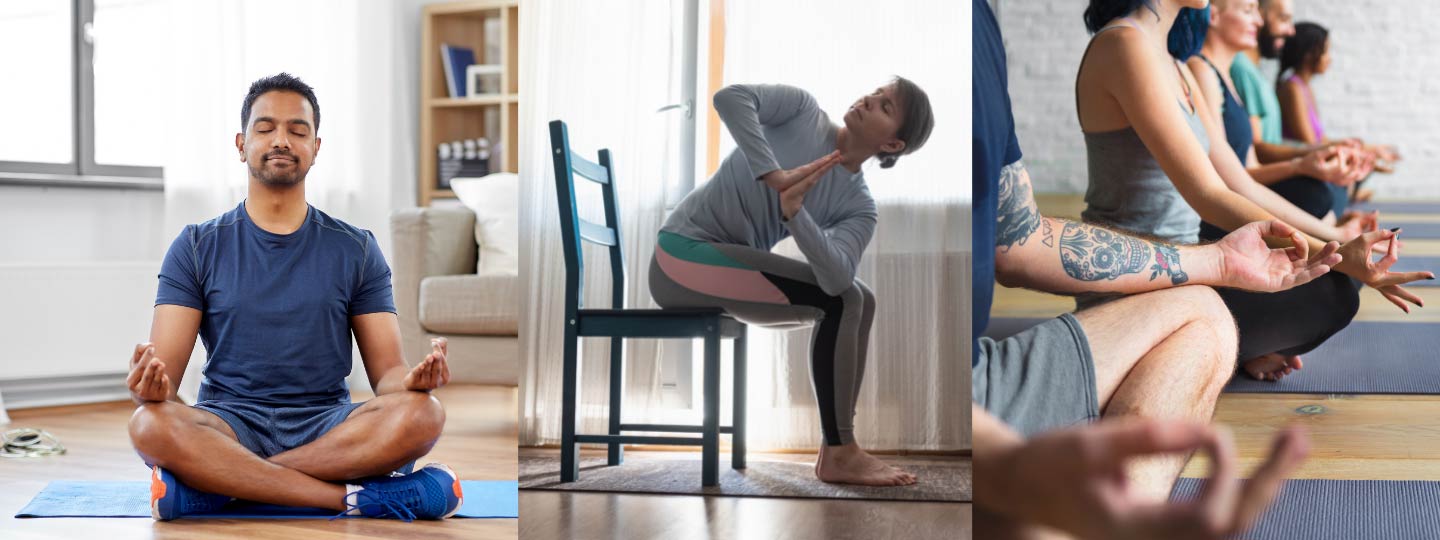Why are yoga and tai chi beneficial for our bodies and minds?
20 May 2022
It’s easy to avoid exercise and moving a lot when you have arthritis and if you’re in pain.
Many studies have shown that gentle exercise can help the symptoms of arthritis, easing pain and stiffness. Exercise doesn’t have to be hard, though. Both yoga and tai chi have been found to be beneficial for arthritis, improving strength, flexibility and fitness, while also being good for mental health.
“Yoga is a nice, gentle way for people who are scared of exercise to begin to move,” says Silvia Laurenti, senior physiotherapist and yoga therapist at the Minded Institute. “By learning simple movements, people feel empowered and more confident, and conditions, such as depression, might lift a little.”
This is backed up by a study published in Restorative Neurology and Neuroscience. It found that eight weeks of intensive yoga significantly improved the physical and mental health of people with rheumatoid arthritis and reduced the severity of depression. It’s something that Lisa Muehlenbein, therapeutic specialist at Yoga Medicine, has experienced herself. “I notice that the pain in my knees and wrists decreases following my yoga practice,” she says.
“This is because yoga gets the synovial fluid flowing in the larger joints, allowing smoother movement and creating a greater range of motion and increased flexibility.”
How can yoga help?
With osteoarthritis, asanas – which are the physical postures in yoga – can increase strength and flexibility and help prevent and manage flare ups. They can also be used alongside physiotherapy to aid recovery from a joint replacement.
Similarly, with rheumatoid arthritis, yoga can be used to maintain strength and flexibility when the condition is stable. As muscles are stretched, tension that is caused by lack of movement is also released. Yoga can also change the way a person experiences the condition. “Pranayama (breathing), mindfulness meditation, restorative poses and relaxation can help manage symptoms of chronic pain,” Laurenti explains.
How can tai chi help?
Originating in China, tai chi consists of fluid, gentle movements that are slow and relaxed. There are many variations, but a programme designed for people with arthritis can be beneficial in reducing stress, improving balance and offering some pain relief.
There is some evidence to suggest that tai chi can improve mobility in the ankles, hips and knees in people with rheumatoid arthritis, but it’s unclear whether it can reduce pain or improve the quality of life for people with the condition.
Easing pain
A review found aerobic and mind-body exercise (such as tai chi and yoga) to be useful for people with hip and knee osteoarthritis. It also found that mind-body exercise had similar effects to aerobic exercise for pain, with the potential to influence central pain sensitisation, sleep disturbance, and mood disorders.
Although yoga and tai chi can be done at home, there are plenty of classes throughout the UK that offer friendship and social support, as well as a space to get help with your practice. Just getting out to a class can lift your spirits and motivate you to continue with the exercise.
Learn more about the different types of complementary treatments and how they can help.
Find out more
- The British Wheel of Yoga can help find teachers and yoga studios in your area
- You can find out more and search for instructors in your area at taichiunion.com and taichiforhealthinstitute.org
We’re here whenever you need us.
If you want help, support or information, get in touch.
- Call our Helpline on 0800 5200 520 (Monday to Friday, 9am to 6pm)
- Talk to our arthritis virtual assistant, 24/7
- Take a look at what's on in your area
- Join our online community
- Follow us on Twitter, Facebook and Instagram
You might also be interested in...
-
“Fitness and movement are my ‘magic’.”
Jemma, a qualified yoga teacher, shares how regular exercise and having a healthy, balanced diet has helped with her arthritis and living in lockdown.
-
These little changes have already added up to a bigger change in how I'm feeling about my life.
Our Digital Community Engagement Officer Sharon Kilty shares her experience of living with arthritis and practicing daily gratitude.